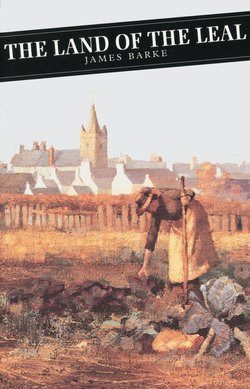Читать книгу Land Of The Leal - James Barke - Страница 15
На сайте Литреса книга снята с продажи.
SPRINGTIME
ОглавлениеThe winters were hard. There were long periods of frost when the earth was iron-bound; there were snows that covered the hedges and lay in deep drifts in the hollows of the land; snows that covered the land for weeks till the coming of the thaw.
Springtime came, snell and bleak, towards the end of March. Spring came with the peesweeps and the whaups coming back from the shore to the tilled soil and the moorland. Springtime came with the immemorial sowing of seed, with harrowing and rolling, with draining and fencing, with the sough of spring rain always in the wind.
Springtime signified the opening of a new year of increased toil and activity for every one. But above all it meant one thing to the Rhinns of Galloway: springtime meant calving time.
From the beginning of March till the end of April there was hardly a night that the dairyman was not called out of his bed by the lowing of a cow in labour. There were nights when all the sleep he got was a few minutes snatched on a bunch of straw in a vacant stall. In a land where herds averaged one hundred and fifty milk cows, there could be no question of sleep at calving time.
Sometimes the births were easy. Sometimes they called for much obstetric skill and not a little physical strength. Often a heifer would give rise to much trouble and anxiety: sometimes the fear of milk fever caused more sleepless nights than actual time spent out of bed in the byres.
Not only had the byreman to be out of bed: his wife or his daughter had also to accompany him to milk the cow while the dairyman attended to the calf. And for every calf born in the night there was, as the result, an extra cow requiring milking in the morning.
Over all the land the lowing of cows in the pain and agony of labour could be heard. Some might be dropped in the fields by day. But mostly they were trailed from their mother’s womb in the byres: often as not in the early hours of the morning when the light was no more than the pale and inadequate beam thrown by a lantern resting on the byre walk, flickering and waving as the draught caught it from under the byre door.
In springtime the dairy farmer reaped his harvest. The more calves the more milk: the more milk the more cheese: the more cheese the more profit. But the harvest needed its slaves and these were provided by the dairymen. For them there could be no question of rest; no thought of respite. Day and night they were tied to the byre, tied to the cattle beasts – never resting with an easy mind even when the occasion for rest presented itself. And should their wives also be with child, then indeed their cup was full to overflowing.
Not for the dairyman did the lengthening days and the soft winds and the singing of birds arouse feelings of joy and gladness. Nor did the swelling bud on the thorn promise release from the winter’s darg. Deep down perhaps he welcomed the approach of the June days when the cattle could stay out for the night and relieve him of a weary nine months round of mucking and bedding and feeding. But he would need to plumb his very depths indeed to discover such pleasant anticipation. For the overwhelming urgency of calving obliterated any pleasant thought of the morrow and what it might bring forth.
Yet the peesweep tossed and grass put forth its shoots and the spring rains swept over the turning soil: the days lengthened and the sun grew in strength and the mavis, vibrant throated, with a deep age-long sorrow, sang its love song to the morn.
Of what consequence that man, back bent in toil, had no ear for such music? From every thorn bush the song went forth, a pæan of praise, that the earth had been born yet again.
